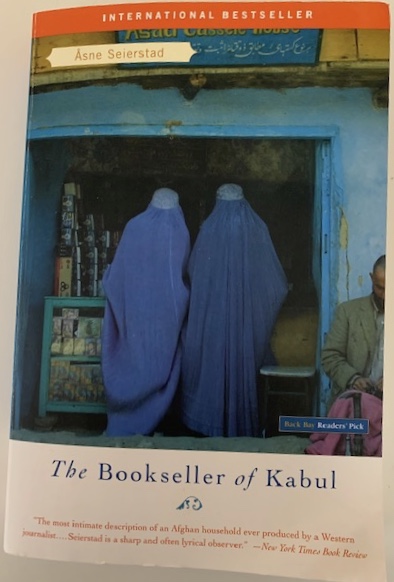
The Bookseller of Kabul by Asne Seierstad
Rarely, if ever, has a book left me with such profound feelings of sadness. This book made me feel shock. Despair. Hopelessness. To learn that—even when Afghanistan was briefly “freed” from the tyranny of the Taliban—women were still slaves to their husbands, sons, families, culture.
Rather than try to convince you how evil the religion and culture of Afghanistan are, let me simply quote some of the most profound statements from the author, Asne Seierstad, who lived with “the Bookseller, Sultan” for several months, and has written this shocking account in first person.
“Sultan was convinced that under the Taliban the country grew increasingly poor, dismal, and insular. The authorities resisted all modernization; they had no wish to either understand or adopt ideas of progress or economic development. They shunned scientific debate, whether conducted in the West or in the Muslim world. Their manifesto was above all a few pathetic arguments about how people should dress or cover themselves, how men should respect the hour of prayer, and how women should be separated from the rest of society. They were not conversant with the history of Islam or Afghanistan, and had no interest in either” (p. 11).
“Khost is a town without women, at least on the surface. While in Kabul during the first spring following the fall of the Taliban, women were starting to throw off the burka, and one could, from time to time, see women in restaurants, in Khost women are rarely seen, not even hidden behind the burka. They lead a life locked in their backyard; they never go out, shop, or even visit. The law of purdah reigns, the total segregation of men and women” (p. 258).
“Leila remembered the conversation they had had about Jamila. Sharifa had told her about the young girl’s death by suffocation.
‘What about her?’ Yunus exclaimed. ‘You mean the girl who died when an electric fan short-circuited?’
Yunus did not know that the bit about the electric fan was a lie, that Jamila was killed because a lover had visited her at night. Leila revealed the full story.
‘Awful, awful,’ he said. Leila nodded.
‘How could she?’ he added.
‘She?’ Leila exclaimed. She had misunderstood the look on his face and thought it was shock, anger, and sorrow over the fact that Jamila had been suffocated by her own brothers. But it was shock and anger that she could have taken a lover” (p. 273).
“In parts of Afghanistan, especially in the southeastern part of the country, homosexuality is widespread and tacitly accepted. Many commanders have young male lovers, and one often sees old men followed by a bunch of young boys. The boys adorn themselves with flowers in their hair, behind the ear, or in a buttonhole. This behavior is often explained by the strict purdah practiced in the southern and eastern parts of the country. It is not rare to see a gaggle of mincing, swaying boys” (p. 259).
In my estimation, the vast majority of the people of Afghanistan have absolutely no concept of unconditional love. Unconditional forgiveness. Truth and morality. Feelings are completely shunned. Absolute authority is given to the patriarch and then the sons to rule over the wife/mother. And women are totally powerless.
The main reason I felt compelled to write this book review? To urge you to read this book—especially if you are angry and dissatisfied with the lives we lead here in the United States. We have no idea…no concept…no appreciation whatsoever for how too many live in other parts of this world.
I think we all need to spend time on our knees to thank our God for…
Our freedoms as Americans, as women in America, and Christians
That we at least understand and can attempt to love and forgive unconditionally
Our churches, and the right to worship our God as we choose
Our homes
Our right to do exactly what I’m doing right now: Express my opinion, without fear of being dragged off to a prison for doing so.
Please, my God, may I be cognizant of my blessings…and thank you for what I take for granted. May I have a grateful heart.
And may you free these people held as captives to an evil religion.

Comments 1
Thank you for this review
Will read the book.